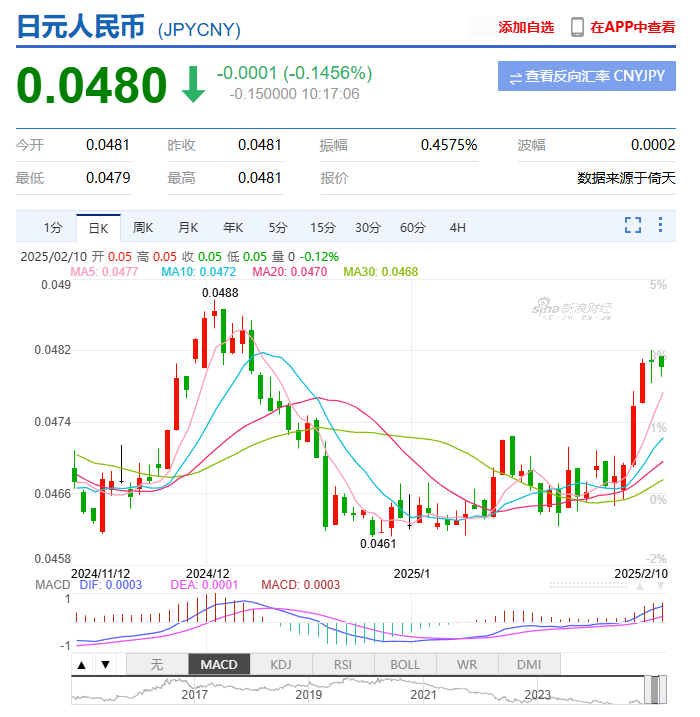Yen 4.8, is it expected to break 5?
Jennifer Johnson - 2025-02-14 16:29:37.0 331

Since Trump announced the tariff order, the yen exchange rate has risen instead of falling compared to currencies such as the euro and the British pound.
The market generally believes that Japan is considered to be a relatively less affected country, so the yen becomes a safe haven for funds.
Sure enough, since the beginning of the month, the yen has risen for many days, showing an overall upward trend.
As of February 10, 2025, the yen is already 4.8!

Source: Sina Finance
So, why is the yen rising?

The reason for the rise of the yen
1. The recovery of the Japanese economy
Kiyosaku Kameda, former chief economist of the Bank of Japan, said that wages and service prices in Japan are continuing to rise, which means that Japan's economy is recovering and the growth trend is stable.
This positive development has given investors more confidence in the Japanese economy, which has contributed to the appreciation of the yen.
2. The Bank of Japan is expected to raise interest rates
In the past, Japan has maintained ultra-low or even negative interest rates for a long time.
On 6 February, the Bank of Japan said it would raise interest rates by 1% this year.
At the same time, the Bank of Japan expects to continue to raise interest rates in the future to maintain stable economic development, and this policy adjustment will further enhance the value of the yen.
3. Fed rate cut expectations have strengthened
The Federal Reserve's monetary policy is an important bellwether for the global capital market. In the past few years, in order to curb high inflation in the United States, the Federal Reserve has continued to raise interest rates, which has kept the dollar strong.
However, with Trump in power, U.S. economic growth has slowed, and the market consensus is that the Fed is likely to start cutting interest rates.
The depreciation of the dollar will become a high probability event, and the appreciation trend of the yen will also strengthen.
4. The global trade situation is tense
Due to the uncertainty caused by global trade frictions, many central banks have been forced to adjust monetary policy, such as the Federal Reserve may cut interest rates, and the European Central Bank is facing recessionary pressure.
The Bank of Japan's policy adjustments have been more modest, making the stability of the yen more prominent.
Trade tensions have heightened uncertainty for businesses and investors, and the yen has emerged as an important safe-haven option.
5. Geopolitical turmoil
In recent years, the geopolitical landscape has become increasingly volatile, and the demand for safe haven in capital markets has risen.
Gold prices continue to hit new highs, showing strong demand for safe-haven assets.
Traditional safe-haven assets, such as Swiss and Hong Kong, have generally become less attractive due to geopolitical influences.
As a result, the market sought new safe-haven assets, and Japan became a new capital inflow highland.

The yen's appreciation trend is likely to slow down
The future trend of the yen's exchange rate is not only affected by the policy of the Bank of Japan, but more importantly, by the interest rate decision of the Federal Reserve.
The yen's current appreciation is mainly due to increased safe-haven demand, especially due to factors such as the imposition of tariffs in the United States.
Although foreign exchange market analyst Keiko Ninomiya analyzed that "the safe-haven trend towards the Japanese yen, which is not explicitly listed as a target for tariff increases, has strengthened." Considering the risk of tariffs, "the only currencies that can be purchased at the moment are the yen or the dollar."
Although the yen is likely to continue to appreciate, Kanda, director of research at the Japan Research Institute, said that there is little room for the yen to appreciate in the future, as Japan's pace of interest rate hikes is slower and interest rate differentials with the United States are unlikely to narrow significantly in the short term.
As a result, the yen's appreciation is likely to slow down, its sustainability is questionable, and there is still a great deal of uncertainty about how the yen will move in the future.
Panda Remit, the choice of millions of users worldwide, provides safer, more convenient, more reliable and more affordable cross-border remittance services.
It now covers more than 50 countries/regions and dozens of currencies, and supports more than 500 banks and major wallets such as Alipay, WeChat and PayPal.
Panda Remit can meet your multiple remittance needs, including global remittance, large-value remittance, remitting RMB from China and tuition payment.
Panda Remit offers the industry's best exchange rates and lowest fees to ensure the safety of your funds, and have been certified by PCI DSS. With our global presence and regulatory compliance, you can enjoy a convenient service 24/7 during the remittance process.
Visit Panda Remit website/APP to enjoy the new experience of global remittance, more money arriving at faster speed!


